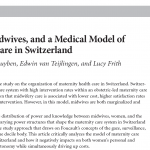 Today ResearchGate informed Prof. Vanora Hundley and I that our paper in the Nursing Standard of 2002 had reached 90,000 reads. This short methods paper called ‘The Importance of Pilot Studies’ [1] was one of our earlier attempts, nearly two decades ago, to publish more of our work in practitioners journals. This approach has been highly successful in terms of reaching a wider audience. We have written longer, more sophisticated research methods papers on pilot studies over the years, including in the Journal of Advanced Nursing, Social Research Update, and the SAGE encyclopedia on research methods [2-6], but none of these has been read or cited as often as our short paper in the Nursing Standard.
Today ResearchGate informed Prof. Vanora Hundley and I that our paper in the Nursing Standard of 2002 had reached 90,000 reads. This short methods paper called ‘The Importance of Pilot Studies’ [1] was one of our earlier attempts, nearly two decades ago, to publish more of our work in practitioners journals. This approach has been highly successful in terms of reaching a wider audience. We have written longer, more sophisticated research methods papers on pilot studies over the years, including in the Journal of Advanced Nursing, Social Research Update, and the SAGE encyclopedia on research methods [2-6], but none of these has been read or cited as often as our short paper in the Nursing Standard. 
 The term ‘pilot studies’ refers to mini versions of a full-scale study (also called ‘feasibility’ studies), as well as the specific pre-testing of a particular research instrument such as a questionnaire or interview schedule. Pilot studies are a crucial element of good study design. Conducting a pilot study does not guarantee success in the main study, but it does increase the likelihood of success. Pilot studies fulfill a range of important functions and can provide valuable insights for other researchers. There is a need for more discussion among researchers of both the process and outcomes of pilot studies.
The term ‘pilot studies’ refers to mini versions of a full-scale study (also called ‘feasibility’ studies), as well as the specific pre-testing of a particular research instrument such as a questionnaire or interview schedule. Pilot studies are a crucial element of good study design. Conducting a pilot study does not guarantee success in the main study, but it does increase the likelihood of success. Pilot studies fulfill a range of important functions and can provide valuable insights for other researchers. There is a need for more discussion among researchers of both the process and outcomes of pilot studies.
References:
- van Teijlingen E, Hundley, V. (2002) ‘The importance of pilot studies’ Nursing Standard 16(40): 33-36. Web: nursing-standard.co.uk/archives/vol16-40/pdfs/vol16w40p3336.pdf
- van Teijlingen E, Rennie, AM., Hundley, V, Graham, W. (2001) The importance of conducting & reporting pilot studies: example of Scottish Births Survey, Journal of Advanced Nursing, 34: 289-95.
- van Teijlingen E, Hundley, V. (2001) The importance of pilot studies, Social Research Update Issue 35, (Editor N. Gilbert), Guildford: University of Surrey. Web: http://www.soc.surrey.ac.uk/sru/SRU35.html
- Hundley, V., van Teijlingen E. (2002) The role of pilot studies in midwifery research RCM Midwives Journal 5(11): 372-74
- van Teijlingen E, Hundley, V. (2005) Pilot studies in family planning & reproductive health care, Journal of Family Planning & Reproductive Health Care 31(3): 219-21.
- van Teijlingen E, Hundley, V. (2003) Pilot study, In: Encyclopaedia of Social Science Research Methods, Vol. 2, Lewis-Beck, M., Bryman, A. & Liao, T. (eds.), Oregon, Sage: 823-24.
 More pilots please!
More pilots please! Paper by BU academics used as example in Dutch university newsletter
Paper by BU academics used as example in Dutch university newsletter New paper international midwifery
New paper international midwifery New international midwifery paper
New international midwifery paper










 Expand Your Impact: Collaboration and Networking Workshops for Researchers
Expand Your Impact: Collaboration and Networking Workshops for Researchers Visiting Prof. Sujan Marahatta presenting at BU
Visiting Prof. Sujan Marahatta presenting at BU 3C Event: Research Culture, Community & Can you Guess Who? Thursday 26 March 1-2pm
3C Event: Research Culture, Community & Can you Guess Who? Thursday 26 March 1-2pm UKCGE Recognised Research Supervision Programme: Deadline Approaching
UKCGE Recognised Research Supervision Programme: Deadline Approaching ECR Funding Open Call: Research Culture & Community Grant – Apply now
ECR Funding Open Call: Research Culture & Community Grant – Apply now ECR Funding Open Call: Research Culture & Community Grant – Application Deadline Friday 12 December
ECR Funding Open Call: Research Culture & Community Grant – Application Deadline Friday 12 December MSCA Postdoctoral Fellowships 2025 Call
MSCA Postdoctoral Fellowships 2025 Call ERC Advanced Grant 2025 Webinar
ERC Advanced Grant 2025 Webinar Update on UKRO services
Update on UKRO services European research project exploring use of ‘virtual twins’ to better manage metabolic associated fatty liver disease
European research project exploring use of ‘virtual twins’ to better manage metabolic associated fatty liver disease
Amazing news! Well done both. Really helpful publications and signposted our students to support their research too.